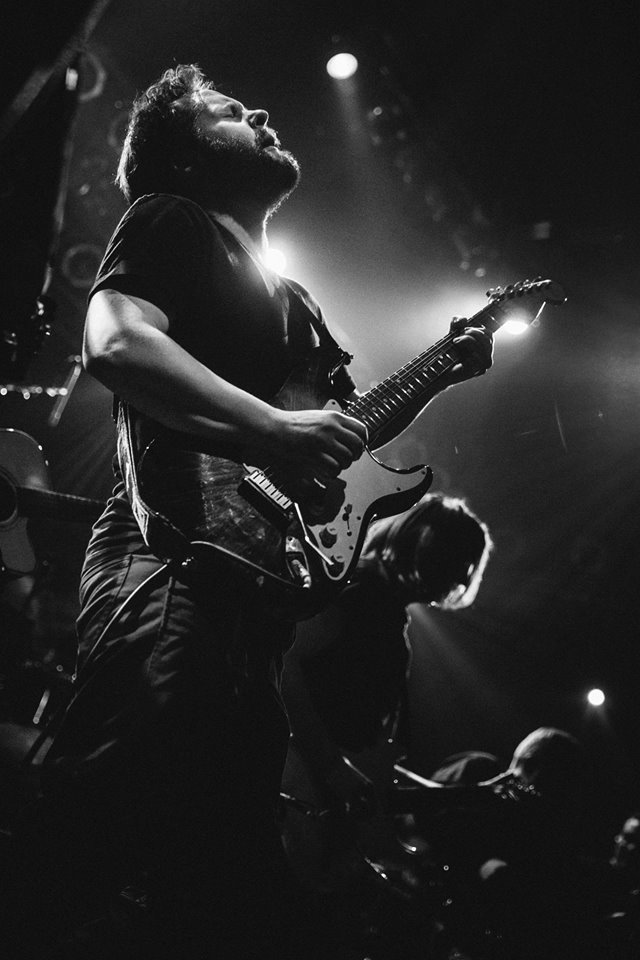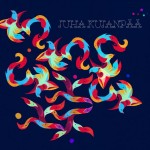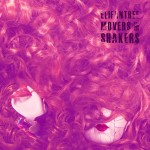
Tapio Ylinen is a musician, radio host and runs Eclipse Music, a Tampere-based label putting out unusual – and often wonderfully uncategorisable – recordings by some of Finland’s leading musicians.
1. What was your first musical instrument, and what did it mean to you?
I got my first guitar as a Christmas present when I was 6 years old. I tried playing classical guitar for a while but I couldn’t get into the music at the time. I had started listening to The Police, Dire Straits and Mike Oldfield. I think I had that kind of music in mind when I told my parents I’d like to have a guitar, so I couldn’t understand what my teacher was trying to do.
My first guitar, then, wasn’t that meaningful until a few years later, around the time I was 10 or so. My father has a huge vinyl collection and I was listening to a lot of guitar-driven music. Eric Clapton, Doobie Brothers, Crosby, Stills and Nash etc. We had woodwork at school and around that time I made a single string wooden banjo that I started playing with. My father heard me playing and dug out my old nylon string guitar and so I started relearning the guitar by listening to records, playing by ear and looking up chords in my father’s library of sheet music. Thus began a lifelong love affair with the guitar. Soon I just had to have a Stratocaster because Eric Clapton and Mark Knopfler both played the strat.
2. What was the first music you ever bought, and the most recent?
As a kid I had a lot of cassettes. They were mostly mix tapes of The Beatles, Mike Oldfield, Pink Floyd and various hit singles from the 60s that my father had recorded for me and my younger sister. I listened to those a lot.
The first album that I bought myself, if memory serves, was a CD of Tubular Bells II by Mike Oldfield. I had listened to the original Tubular Bells from those cassettes for years so I was really curious to hear the sequel. At some point I also bought PULSE, the live Pink Floyd double CD, which made a huge impact. I’m currently, rather ironically, playing in a Pink Floyd tribute group called PULSE. So even though I’ve expanded my musical taste to jazz, classical and all kinds of music, I’m still staying true to my roots.
The most recent albums I bought were Jon Lord’s Concerto For Group And Orchestra (a nice hybrid of hard rock, jazz and classical) and a new vinyl pressing of (Finnish prog/jazz legend) Pekka Pohjola’s album B The Magpie.
3. What’s the balance of preparation vs. improvisation for the average recording?
That depends entirely on the music. As the label manager of Eclipse I’ve seen and heard both ends of the spectrum, and no two groups are the same in this regard. I was just talking to Timo Kämäräinen – the guitarist for Electro GT and Juha Kujanpää’s ensemble amongst others – about his sessions for Juha’s latest Goldwing album. Juha’s music, even though it has a lot jazz elements and some improvisation, the orchestrations and arrangements on that album require quite a precise way of playing, so quite a lot of preparation goes into that kind of approach.
On the other hand, on Liberty Ship’s albums for example, the whole point in the music is for the musicians to go where ever the current takes them. Too much preparation kills the whole thing.
Personally, as a musician and songwriter, I like the David Gilmour kind of approach to songwriting where the composition, the song itself, creates a tension that the improvised, instrumental solo (usually at the end of the song) releases. At best it’s very emotionally powerful. But, then again, using that approach you have to think quite a lot about the way you improvise in order to get the right emotional nuance to the solo. You can’t just play anything.
So I guess the answer is: whatever is right for the overall piece.
4. What’s the one quality you think every musician must have?
Emotional sensitivity. Music is all about emotion. One doesn’t have to be technically brilliant in order to get under the audience’s skin. It’s the same thing with recording. It doesn’t have to be hi-fi all the time. Sometimes a really rough, technically flawed recording is better than a polished one if it captures a special moment of music. And, again, it’s the same with composition. Even though I enjoy complex music and freeform atonal jazz exploration, simple songs work just as well. They just evoke different emotions. The best musicians, songwriters and producers are sensitive to which elements in the music are the ones that evoke emotion. Or perhaps I should say “the right emotion” (whatever that is) that is appropriate to that piece of music.
5. Who is the most inspiring person (or people) you’ve collaborated with, and why?
I’ve had the fortune of working, as an executive record producer, with many of the best jazz musicians in Finland, the group Elifantree, Esa Pietilä, Olavi Louhivuori to name a few. I’m in awe of their skills as players and composers in a field of music that I enjoy very much as a listener, but can’t really play as a musician.
My father (Timo Ylinen) and his older brother (songwriter Markku Ylinen) have been big early influences in the singer-songwriter field of music giving me an important gateway into songwriting.
But perhaps the most memorable collaboration I’ve had was quite recently when we played an evening of Pink Floyd’s music with PULSE. Our featured vocalist was Durga McBroom who toured and recorded two albums and two live records with Pink Floyd between 1987 and 1994. Not only was I a big fan of her vocal styles, but the whole experience happened at a very emotional time in my life. My dear wife was, tragically, losing her long battle with cancer. By the time we played the concert at the end of last May she only had a few weeks to live. Durga dedicated her vocal solo in The Great Gig In The Sky to her. The next morning she came by our apartment. She and I played Wish You Were Here to my wife. It was the last piece of live music she ever heard.
6. Where do you stand on the streaming/downloading/file-sharing/musicians-not-getting-paid-for-their-music debate?
Whether we like it or not, the future (and present, actually) of the music industry and the distribution of music is in digital streaming. I personally still love buying CDs and vinyl, but it’s undeniable that streaming is just simply an easier way to listen to music for the general public. We can argue about audio quality etcetera, but these things tend to go which ever way is the most convenient for the consumer.
Now, on the other hand, not counting the very top of mainstream pop, with the current royalty rates from streaming services it’s very unlikely artists and smaller labels are going to make much revenue from streaming any time soon. Most of the revenue coming in to Eclipse Music still comes from CD sales. This is probably due to the fact that jazz and prog fans tend to prefer physical records to digital, but there is no telling how long this is going to last. Whether in 5 years or 10, streaming will be most popular distribution channel even for us and we need to prepare for that.
The problem isn’t streaming as a format. My concern is with the imbalanced way the revenue is distributed. If a hardcore fan of Elifantree subscribes to Spotify and listens only to their tracks, most of the revenue he/she generates still goes to Taylor Swift (or insert your favourite generic pop star here) because she was the most popular artist on Spotify that month. This is what ultimately needs to change if we are to have any chance in the indie music / marginal music field. Unfortunately, as I understand it, the big labels own shares in Spotify so obviously changing the revenue stream that currently favours them is not in their interest right now.
Bandcamp has recently launched their own private streaming system where around 85-90% of the revenue goes straight to the artist / indie label. Eclipse Music is currently accepting first subscribers to our streaming catalogue and it’s looking fairly promising. Supporting your favourite artists that way might help things, perhaps.
7. If money and time were no object, what would your next project be?
I’m currently writing music for my second album (looks like it’s going to be a prog epic), but I think that project might happen even though the budget is very close to zero Euros. I can always record it in my home studio. So maybe something a bit more ambitious.
In addition to studying music I also did my masters degree in film screenwriting. I’ve been slowly developing a script for a feature film that’s set in the music business. It’s a story about an old reclusive rock star who begins to mentor a young and reckless songwriter. A simple, but dramatic story about whether lost souls can become functioning human beings again. But even simple films are expansive to make, so if money wasn’t an issue I’d probably make that my next project and made sure we’d have somebody like Darren Aronofsky or P.T. Anderson directing it. I already have songs that would fit the soundtrack perfectly. One of them being a song called “Brother Come Back” which is the English (and actually the original) version of one of the songs on my debut album “Nuoruus”.
I don’t know if Mads Mikkelsen sings or plays the guitar, but he’d be great in the leading role if he did.
For the all the latest from Eclipse Music, check out the website eclipse-music.net
Tapio’s album “Nuoruus” is available from Eclipse (of course!)
Other albums from Eclipse mentioned above are…





